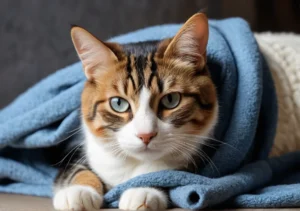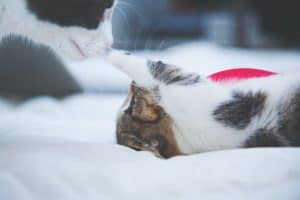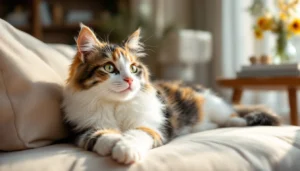Have you ever noticed your cat aggressively kneading and wondered what could be behind this behavior? Below, we’ll explore the reasons why your feline friend may exhibit this fascinating yet sometimes intense action.
Kneading is a common behavior in cats that stems from their kittenhood instinct of kneading their mother’s belly to stimulate milk flow. When cats knead, they are expressing comfort, contentment, or a need for attention. However, aggressive kneading can sometimes indicate underlying issues that need to be addressed. Let’s dive deeper into the reasons why your cat may be kneading aggressively.
Natural Instincts at Play
Cats are known for their unique and sometimes mysterious behaviors, and kneading is no exception. This common behavior actually stems from a cat’s natural instincts dating back to their kittenhood. When kittens nurse from their mother, they instinctively knead the area around the mother’s teats to stimulate milk flow. As they grow older, this behavior persists as a way to comfort themselves and mark their territory with scent glands located in their paws.
Aggressive kneading may also be a leftover behavior from their wild ancestors. In the wild, cats would knead the ground to create a comfortable nesting spot or to mark their territory with their scent. So, if your cat is aggressively kneading, it may be a way for them to assert their territory or simply find comfort in their environment.
Seeking Comfort and Security
Kneading can also be a cat’s way of seeking comfort and security, especially in stressful situations. Just like humans might fidget or twirl their hair when feeling anxious, cats may knead to help them relax and feel safe. By kneading a soft surface like a blanket or your lap, they may be trying to recreate the cozy feeling of being with their mother as a kitten.
If your cat is displaying aggressive kneading behavior, it could be a sign that they are feeling particularly stressed or anxious. Providing a calm and peaceful environment for your cat, along with plenty of opportunities for play and relaxation, may help reduce their need to aggressively knead.
Pro Tip: To prevent your cat from damaging furniture or scratching you unintentionally during their kneading sessions, consider providing them with a designated kneading area, such as a soft blanket or cushion, where they can safely engage in this behavior without causing harm.
Remember, understanding your cat’s behaviors, such as aggressive kneading, can help strengthen the bond between you and your feline friend. By recognizing the reasons behind their actions, you can create a more harmonious environment for both you and your furry companion.
Territorial Marking
When your cat aggressively kneads, they might be engaging in a bit of territory marking. Cats have scent glands in their paws, and when they knead, they release pheromones that help them mark their space. It’s like they’re saying, “This is mine!” If your cat is kneading with vigor, they could be reinforcing their ownership of their territory. Providing your cat with a comfortable and cozy space that they can claim as their own might help decrease their need to aggressively knead and mark their territory.
Attention-Seeking Behavior
If your furry friend is kneading with intensity, it could be a cry for attention. Cats are social creatures and enjoy bonding with their humans. Aggressive kneading might be their way of saying, “Hey, pay attention to me!” Interactive play sessions, cuddle time, or a few extra chin scratches could help fulfill your cat’s need for interaction and affection. Remember, spending quality time with your cat is essential for their well-being and can help reduce their urge to knead aggressively.
Additional Insight: Providing your cat with a variety of engaging toys and environmental enrichment can also help reduce their need to seek attention through aggressive kneading. Rotate their toys regularly to keep them mentally stimulated and physically active, allowing them to expend energy in more positive ways.
Potential Health Concerns
When it comes to your cat aggressively kneading, it could be a sign of underlying health issues. Arthritis or pain can cause your cat to knead more intensely than usual. If your furry friend is experiencing discomfort, they may knead aggressively to try and alleviate their pain. To address this behavior, it’s important to consult with your veterinarian to rule out any health issues and determine the best course of action to help your cat feel better.
Addressing Aggressive Kneading
If your cat is exhibiting aggressive kneading behavior, there are ways to manage and address it effectively. One approach is to provide them with a soft, comfortable surface, like a plush blanket or pillow, to knead on. This can help reduce any pain or discomfort they may be experiencing while also redirecting their energy in a positive way. Additionally, engaging your cat in interactive play sessions or providing them with toys can help alleviate stress and prevent them from kneading aggressively. Remember, patience and consistency are key when addressing your cat’s behavior, so be sure to stay calm and positive throughout the process.
Tips for Addressing Aggressive Kneading: 1. Offer a soft, comfortable surface for kneading. 2. Engage your cat in interactive play sessions. 3. Provide stimulating toys for mental and physical exercise. 4. Consult with your veterinarian for further guidance on managing aggressive kneading behavior.
For more information on feline health and behavior, you can check out the American Association of Feline Practitioners’ website: American Association of Feline Practitioners.
Fun Facts About Kneading
Have you ever wondered why your cat aggressively kneads? Well, here are some fun and fascinating facts about this behavior.
- Kneading is a sign of contentment: When a cat kneads, it’s a throwback to kittenhood when they kneaded their mother’s belly to stimulate milk flow. So, when your cat kneads you or a soft surface, it’s a sign that they are feeling happy and relaxed.
- It’s a way for cats to mark their territory: Cats have scent glands on their paw pads, so when they knead a surface, they are leaving their scent behind. This behavior helps them feel secure and claim their territory.
- Kneading can help cats relieve stress: Just like how we humans might fidget or tap our feet when we’re feeling anxious, cats knead to release pent-up energy and reduce stress.
Creating a Comforting Environment
To help reduce your cat’s need for aggressive kneading, it’s essential to create a peaceful and secure environment for them. Here are some tips to create a comforting space for your feline friend:
- Provide plenty of scratching posts: Cats knead to maintain their claws, so having multiple scratching posts around the house can give them an appropriate outlet for this behavior.
- Create cozy hiding spots: Cats love to have a safe space where they can retreat and feel secure. Consider setting up cozy nooks or cat trees where your cat can relax and unwind.
- Establish a routine: Cats thrive on routine, so try to stick to a consistent feeding schedule, playtime, and cuddle sessions. This predictability can help reduce your cat’s need for anxious kneading.
For more tips on creating a calming environment for your cat, check out this resource on creating a stress-free home for your feline friend.
Alex, a passionate animal lover, has experience in training and understanding animal behavior. As a proud pet parent to two dogs and three cats, he founded AnimalReport.net to share insights from animal experts and expand his knowledge of the animal kingdom.




